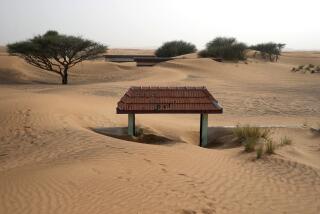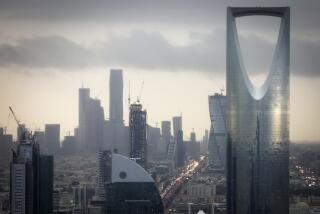Upstart Dubai turns to staid Abu Dhabi for aid
Reporting from Cairo and Beirut — The flashy spendthrift needs his prim, conservative neighbor to bail him out.
Such is the situation between debt-ridden Dubai and flush Abu Dhabi, two Persian Gulf emirates with starkly different financial strategies and temperaments that may grudgingly need each other to prevent long-term investor panic from spreading beyond the United Arab Emirates.
Dubai’s $80-billion debt, nearly $60 billion of it held by the investment conglomerate Dubai World, is testament to the emirate’s overextended reliance on a real estate market whose fortunes tumbled in the global downturn. Unlike much of the region, Dubai was not blessed with vast oil reserves and needs deep pockets to prevent two of its main corporations -- and its reputation -- from collapsing.
Abu Dhabi has deep pockets. The question is: How deep will it dig? It considers Dubai to be an upstart, a boisterous, garish spectacle of steel and glass rising along the Persian Gulf. Oil wealth has conjured a staid sense of stability in Abu Dhabi, which regards itself as shrewd and refined, cautiously expanding its skyline and portfolio.
Analysts think at least a partial bailout plan from Abu Dhabi will be forthcoming; a financially teetering Dubai could over time weaken the entire nation, which comprises seven emirates. The United Arab Emirates’ two stock markets were down 7.3% and 8.3% on Monday over anxiety about Dubai’s problems. And other Gulf nations, including Qatar and Bahrain, are expected to try to entice investors wary of the emirates.
“I fully agree with the ‘Dubai is too big to fail’ rhetoric,” said Samir Ranjan Pradhan, an economic analyst with the Gulf Research Center in Dubai. “You look at Abu Dhabi’s strategy and financial commitment to bail out Dubai as it involves huge stakes for them also.”
Abu Dhabi has already put “a significant proportion of its assets on the line in Dubai, and perhaps even done more than some would expect,” said Hady Amr, director of the Brookings Institution branch in Doha, Qatar. “At some point, you have to temper your support for your own brother when he keeps getting into trouble.”
Over the years, Dubai became a hub for trade, international investment and glitz, attracting movie and sports stars and endless bling and buzz. That attention has agitated Abu Dhabi, which prefers tribal circumspection and seeks artistic and cultural respectability; the emirate will eventually house branches of the Guggenheim and Louvre museums.
Abu Dhabi’s oil reserves may not last forever, but they give it clout these days in negotiations with Dubai.
“Absolutely this is a power play. This is a message from Abu Dhabi to Dubai that we are the ones calling the shots, we are the ones in a position to rescue you,” said Ibrahim Saif, a political economist at the Center for Strategic Studies at the University of Jordan. “Abu Dhabi is asserting itself and Dubai clearly is resisting and trying to manage it without them, but now we know they can no longer sustain that, and they have some bad times ahead of them.”
Saif added: “This rivalry within the emirates has become quite noticeable in the past few years. Abu Dhabi has invested a lot in education. They are trying to take advantage of what is happening there, granted they have oil money as well so they can afford to build themselves slowly.”
It is unclear what will happen in the United Arab Emirates’ financial markets in coming days as Dubai World, which oversees the real estate developer Nakheel, seeks to suspend debt payments while it puts together a restructuring plan. The central bank has promised to stand by foreign and domestic banks with holdings in the country.
The five other emirates, lacking the economic and political power of Dubai and Abu Dhabi, can do little but mediate from the sidelines.
Dubai officials insist their emirate’s financial problems have been exaggerated. It is unlikely, however, that such a scenario would have unfolded in Abu Dhabi.
The emirates make up one country “but they act separately,” said Yasser Akkawi, chairman of Capital Concept in Beirut. “Each emirate has its own economy. Abu Dhabi will do what is in its own interest.
“They have gas and oil and they invested what they had so they didn’t have to go into debt,” Akkawi said. “All the real estate projects in Abu Dhabi only started two years ago, while in Dubai it’s been like five years. When Abu Dhabi invests, it uses its own oil money. Dubai didn’t really manage risk well. We don’t see them managing a crisis; they weren’t even prepared for it.”
Lutz is a special correspondent.
More to Read
Inside the business of entertainment
The Wide Shot brings you news, analysis and insights on everything from streaming wars to production — and what it all means for the future.
You may occasionally receive promotional content from the Los Angeles Times.











